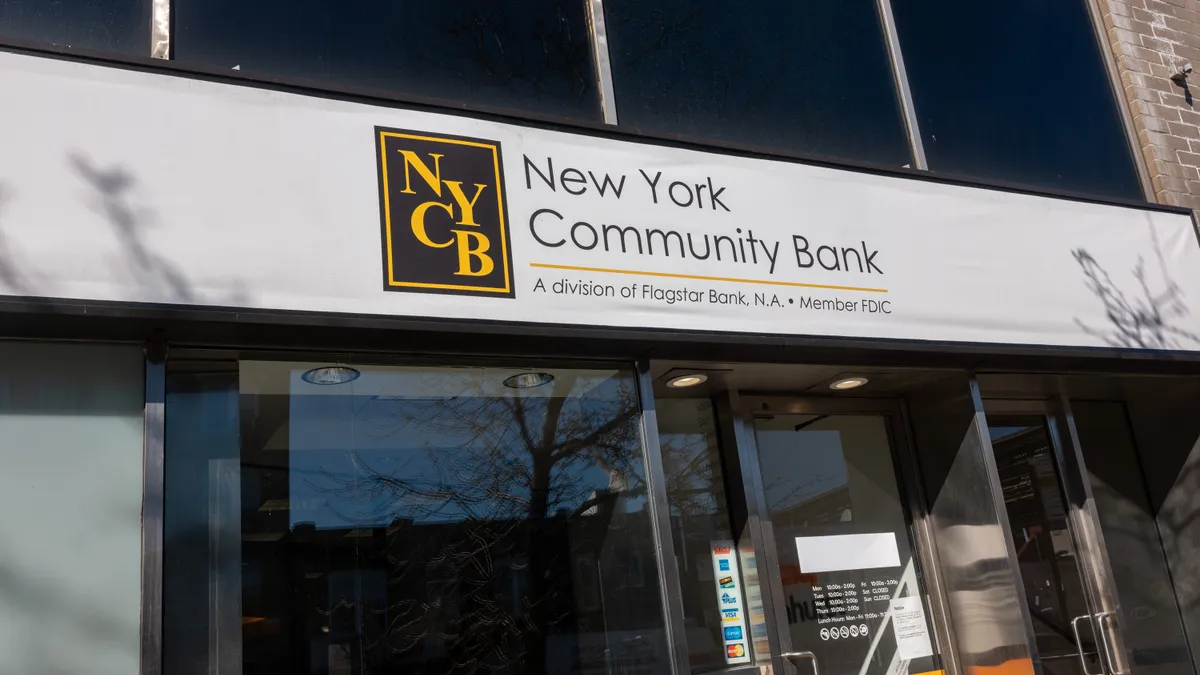New York Community Bank has named Alessandro DiNello as its new CEO, identified “material weaknesses” in the way it measures lending-related risk, and will take a $2.4 billion goodwill impairment charge, the bank announced Thursday in a series of filings.
And the announcements continued Friday, as the bank filled two executive roles whose vacancies had drawn concern from observers in the banking sector.
NYCB named George Buchanan as its chief risk officer and Colleen McCullum as its chief audit executive, effective immediately, the bank said Friday.
Buchanan comes to NYCB from Regions, where he served recently, among many roles over the past 13 years, as chief risk officer for consumer banking and wealth management. In a career that has spanned more than three decades, Buchanan also worked as chief credit officer for small business at U.S. Bank, according to his LinkedIn profile.
McCullum, meanwhile, joins from United Community Bank, where she had served as chief audit executive for less than a year. But her résumé boasts stints at Capital One, Bank of America, Wells Fargo and BNY Mellon, according to LinkedIn.
DiNello, in a statement, called Buchanan and McCullum “proven leaders with large bank and public company expertise and successful track records of delivering operational excellence.”
“George's risk management experience, coupled with Colleen's audit acumen, will be important as we continue to upgrade our executive leadership team and ensure we execute on our goals," DiNello said.
NYCB confirmed last month that its previous chief risk officer had left the bank “in early 2024,” ahead of fourth-quarter results that included a $252 million surprise loss that spurred a downward spiral in the bank’s stock price.
On a call last month, DiNello said NYCB would announce a new chief risk officer “in the very near future” and was “in final discussions” with its top chief audit officer candidate.
Change at the top
DiNello, the former Flagstar CEO whom NYCB named executive chair three weeks ago, succeeds Thomas Cangemi as the bank’s chief executive. Cangemi resigned Feb. 23, effective immediately, but will remain on NYCB’s board, the bank said in a filing Thursday with the Securities and Exchange Commission.
Cangemi’s resignation came on the day the bank completed its goodwill impairment assessment, but his departure “was not the result, in whole or in part, of any disagreement with the Company on any matters relating to the Company’s operations, policies or practices,” the bank said in the filing.
The bank’s board appointed DiNello as CEO two days later. But the board’s presiding director, Hanif Dahya, stepped down, effective immediately, after not supporting DiNello’s ascent to chief executive.
NYCB also named Marshall Lux, a former chief risk officer at JPMorgan Chase’s consumer bank, as presiding director and chair of the board's nominating and corporate governance committee.
The bank’s leadership changes “are reflective of a new chapter that is underway,” DiNello said in a statement Thursday.
"It is my mandate as president and CEO, alongside our board, to continue our transformation into a larger, more diversified commercial bank," DiNello said. "While we've faced recent challenges, we are confident in the direction of our bank and our ability to deliver for our customers, employees and shareholders in the long term.”
Tenfold increase
The $2.4 billion charge NYCB is assigning to 2023’s fourth quarter represents a tenfold increase above the $252 million loss it disclosed Jan. 31. That loss, tied to NYCB’s commercial real estate lending, reignited fears that a new crisis of confidence could sweep regional lenders. In the weeks since then, NYCB shares dropped 54% through market close Thursday.
But NYCB’s filings, which came to light after close, sent the stock plummeting another 23% through noon Friday.
"Everybody thought they had ripped the Band-Aid off three or four weeks ago," Piper Sandler analyst Mark Fitzgibbon told American Banker. "Now it appears that's not the case, and that there's more to come."
Octavio Marenzi, CEO of consulting firm Opimas, told Reuters that NYCB “looks like a bank that is out of control.”
The $2.4 billion loss “has no impact” on NYCB’s regulatory capital ratios, the bank said in an SEC filing Thursday, adding that the impairment charge is tied to transactions from 2007 and earlier. NYCB is also adjusting downward — by $19 million — fixed assets it acquired from Signature Bank, which failed last March. And the bank is paying an additional $10 million toward the Federal Deposit Insurance Corp.’s Deposit Insurance Fund, according to the SEC filing.
Material weaknesses
Fitzgibbon called the material weakness finding “most worrisome,” an assessment Citi analyst Keith Horowitz appeared to share.
"Significant changes will need to be made with respect to how they monitor credit risk, which we expect may lead to them being more proactive on recognizing issues," Horowitz told Reuters.
NYCB’s management “identified material weaknesses in the Company’s internal controls related to internal loan review, resulting from ineffective oversight, risk assessment and monitoring activities,” the bank wrote in an SEC filing Thursday.
NYCB disclosed separately that it would not meet a deadline to timely file its annual report with the SEC, but that the report would be filed within 15 days.
The bank expects to detail in that report its remediation plan for the material weaknesses, NYCB said Thursday.
DiNello’s appointment, meanwhile, “will be viewed favorably,” Raymond James analyst Steve Moss told Reuters, given the track record the newly minted CEO has in turning around Flagstar.
Cangemi’s resignation brings an end to his 23-year stint at NYCB. He joined in 2001 and spent 15 years as CFO before becoming the top executive at the end of 2020.






















